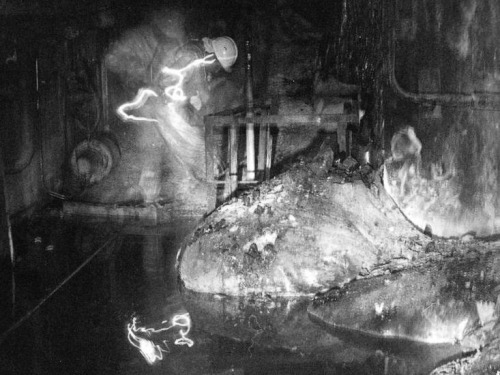Stubborn-turtle-blog

More Posts from Stubborn-turtle-blog and Others
I feel like this belongs in a more futuristic animated movie






Bolles + Wilson. Suzuki House. Tokyo. Japan. photos/ drawing: Ryuji Miyamoto/ Bolles + Wilson. - architecture classic


One of the most dangerous pictures ever taken - Elephant’s Foot, Chernobyl. This is a photo of a now dead man next the ‘Elephant’ Foot’ at the Chernobyl power plant.
The image distortions in the photo are created by intense level of radiation almost beyond comprehension. There is no way the person in this photo and the person photographing him could have survived for any more that a few years after being there, even if they quickly ran in, took the photos and ran out again. This photo would be impossible to take today as the rates of radioactive decay are even more extreme now due to a failed military experiment to bomb the reactor core with neuron absorbers. The foot is made up of a small percentage of uranium with the bulk mostly melted sand, concrete and other materials which the molten corium turns into a kind of lava flow. In recent years, it has destroyed a robot which tried to approach it, and the last photos were taken via a mirror mounted to a pole held at the other end of the corridor for a few seconds. It is almost certainly the most dangerous and unstable creation made by humans. These are the effects of exposure: 30 seconds of exposure - dizziness and fatigue a week later 2 minutes of exposure - cells begin to hemorrhage (ruptured blood vessels) 4 minutes - vomiting, diarrhea, and fever 300 seconds - two days to live
The Sciences, in Brief
Geology: lick the rock
Psychology: brainception
Genetics: Punett squares and percentages
Chemistry: what is water?
Biology: no math for the love of God
Physics: 1001 ways to throw things
Astronomy: the nerds of the science world
50, 100 years down the line, will this be in the history books? Will the "War on terror" be over?

Battle of Mosul begins as forces push toward Islamic State stronghold.
Proportional risk
I've begun to develop a strong fear of the weather. Lightning and wind also terrify me. When someone is afraid of flying, there are statistics which could help them understand how little a risk they are actually taking. With this statistic method in mind, is there anything I could remind myself of when I begin to become frightened, that could help relax me a bit? Thank you :)
Lightning is something that’s serious, but with most things as long as you approach it intelligently, you’ll be fine!
The National Safety Council organized a handy chart of “What are the Odds of Dying From” that has some handy statistics. There’s a lot more things that we are significantly more at risk for statistically than lightning. For instance you have a 1 in 672 chance of dying as a pedestrian in your life while a 1 in 174,426 chance of dying from lightning. Yet we don’t carry the same fear when walking as we do for lightning.

Something to consider here, we’re much more often “exposed” to being pedestrians than we are exposed to lightning, so this makes a bit of sense that the numbers are so skewed, but the point of fear still stands.
Lightning is serious business, but as I said earlier we need to approach lightning intelligently.

If you look at the an analysis of lightning deaths in the US about two thirds of incidents occurred to people engaged in outdoor activities. So basically people that are outside enjoying the day when a storm comes along, and they decide to either watch the storm from an unsafe place, or keep going with the activity. Going further into outdoor “leisure” activities, of that two thirds about 35% of those activities were water related (largely fishing, but hey, why not looks at the study yourself!).
Worth mentioning, the study also pointed out that 79% of victims were male - being okay with risky behaviours doesn’t make you cool and tough, it makes you an idiot. As the study put it:
Possible explanationsfor this finding are that males are unaware of all the dangers associated with lightning, are more likely tobe in vulnerable situations, are unwilling to be inconvenienced by the threat of lightning, are in situationsthat make it difficult to get to a safe place in a timely manner, don’t react quickly to the lightning threat, orany combination of these explanations. In short, because of their behavior, males are at a higher risk ofbeing struck and, consequently, are struck and killed by lightning more often than females.
Here’s a breakdown of activities people are doing when they die from a lightning strike:

Notice these are all things that are outside! The study stated that things that contributed to lightning fatalities were people’s unwillingness to postpone activities, not being aware of approaching storms (you’re either weatherwise, or otherwise!), being in a vulnerable location, an inability or unwillingness to get to a safe place.
So how do we be safe during a thunderstorm? Do as the NOAA says “when thunder roars, go indoors”! If you know there are going to be storms that day stay alert and take a glance at a radar map every now and then (lord knows you probably have a smart phone), and have an idea of where you’ll go when a storm is near. If you’re unable to get indoors avoid hilltops, isolated tall objects like poles or trees, spread out if you’re in a group, and try to avoid wet items and areas - these won’t make you safe, but will slightly decrease your risk. The only completely safe action is getting inside a building or vehicle.

Have a look over this page on lightning safety and these tips for more info.
So bottom line, should you have a healthy respect for lightning? Yes. Should you be terrified of lightning? No. Be smart and follow the safety tips, you’ll be alright.
Thanks for reading, and I hope this helped!

![Yikes! [http://imgur.com/0mHJob3]](https://64.media.tumblr.com/64b1e17ce0a209744bc5d5590c95b597/tumblr_ohxss5q1c51s04h2ho1_500.jpg)
Yikes! [http://imgur.com/0mHJob3]

Mason gives a startling example of the decline of car-wash robots, to be replaced by, as he puts it “five guys with rags”. Here’s the paragraph that really made me think:
“There are now 20,000 hand car washes in Britain, only a thousand of them regulated. By contrast, in the space of 10 years, the number of rollover car-wash machines has halved –from 9,000 to 4,200.”
The reasons, of course, are political and economic and you may or may not agree with Mason’s diagnosis and prescription (as it happens I do). But de-automation – and the ethical, societal and legal implications – is something that we, as roboticists, need to think about just as much as automation.
Several questions come to mind:
are there other examples of de-automation? is the car-wash robot example atypical, or part of a trend? is de-automation necessarily a sign of something going wrong? (would Mason be so concerned about the guys with rags if the hand car wash industry were a well-regulated industry paying decent wages to its workers, and generating tax revenues back to the economy?)

"We have set a clear goal vital to the next chapter of America's story in space," writes the President, "sending humans to Mars by the 2030s and returning them safely to Earth."
Let’s go next Space Race
In early September of 1666, the Great Fire of London devastated the city for four days. Archaeological evidence suggests the searing heat may have reached as high as 3000 F. At that temperature human remains, bones and all, become ash.
-
 esoteric-altruism liked this · 11 months ago
esoteric-altruism liked this · 11 months ago -
 hackr reblogged this · 11 months ago
hackr reblogged this · 11 months ago -
 hackr liked this · 11 months ago
hackr liked this · 11 months ago -
 alux-ulkan reblogged this · 11 months ago
alux-ulkan reblogged this · 11 months ago -
 alux-ulkan liked this · 11 months ago
alux-ulkan liked this · 11 months ago -
 this-is-natural liked this · 4 years ago
this-is-natural liked this · 4 years ago -
 wj630824 liked this · 4 years ago
wj630824 liked this · 4 years ago -
 thisiswhatmylifehasbecome liked this · 6 years ago
thisiswhatmylifehasbecome liked this · 6 years ago -
 idark2015 liked this · 7 years ago
idark2015 liked this · 7 years ago -
 starlight06 liked this · 7 years ago
starlight06 liked this · 7 years ago -
 dexxs-stuff liked this · 8 years ago
dexxs-stuff liked this · 8 years ago -
 rwfwxguy-blog liked this · 8 years ago
rwfwxguy-blog liked this · 8 years ago -
 magenta-mushroom-blog liked this · 8 years ago
magenta-mushroom-blog liked this · 8 years ago -
 lostindallas reblogged this · 8 years ago
lostindallas reblogged this · 8 years ago -
 yasisoy-blog liked this · 8 years ago
yasisoy-blog liked this · 8 years ago -
 xctxsy liked this · 8 years ago
xctxsy liked this · 8 years ago -
 stiekemekat reblogged this · 8 years ago
stiekemekat reblogged this · 8 years ago -
 abyssalcastiel reblogged this · 8 years ago
abyssalcastiel reblogged this · 8 years ago -
 amber-triplett reblogged this · 8 years ago
amber-triplett reblogged this · 8 years ago -
 amber-triplett liked this · 8 years ago
amber-triplett liked this · 8 years ago -
 the-summer-sun-au liked this · 8 years ago
the-summer-sun-au liked this · 8 years ago -
 keeperofthebalance reblogged this · 8 years ago
keeperofthebalance reblogged this · 8 years ago -
 synthcabbit reblogged this · 8 years ago
synthcabbit reblogged this · 8 years ago -
 beachduck liked this · 8 years ago
beachduck liked this · 8 years ago -
 myrababe24 liked this · 8 years ago
myrababe24 liked this · 8 years ago -
 koomzy420-blog liked this · 8 years ago
koomzy420-blog liked this · 8 years ago -
 metalzoic liked this · 8 years ago
metalzoic liked this · 8 years ago -
 bonesonthetardis reblogged this · 8 years ago
bonesonthetardis reblogged this · 8 years ago -
 riveliciousx liked this · 8 years ago
riveliciousx liked this · 8 years ago -
 twistedsouzou reblogged this · 8 years ago
twistedsouzou reblogged this · 8 years ago -
 minmaysuicide liked this · 8 years ago
minmaysuicide liked this · 8 years ago -
 naimononedari liked this · 8 years ago
naimononedari liked this · 8 years ago -
 ludmila199 liked this · 8 years ago
ludmila199 liked this · 8 years ago -
 krysisnowrose-blog liked this · 8 years ago
krysisnowrose-blog liked this · 8 years ago -
 radon-t liked this · 8 years ago
radon-t liked this · 8 years ago
Gaming, Science, History, Feminism, and all other manners of geekery. Also a lot of dance
243 posts
